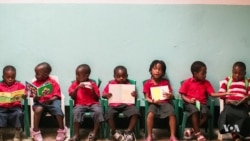The California-based charity Justice Rising is working to educate youngsters in conflict zones, especially the strife-torn eastern section of the Democratic Republic of Congo. It is one of many organizations struggling to meet a need that is largely unmet in trouble spots worldwide, according to the the United Nations Children’s Fund, UNICEF.
Justice Rising built its first school in eastern Congo in 2015 and has since built six others, employing 60 teachers and administrators and serving more than 1,600 students.
Eastern Congo was ravaged by fighting from 1996 through 2003, and flare-ups and killings continue.
“In planting one of these schools in a community that has been torn apart by war,” said founder Cassandra Lee, “you can see a decrease of child soldiers; you can see young girls less likely to be taken as a child bride and in turn become child mothers. You can see community health increase.”
UNICEF says 27 million children are out of school in conflict zones such as Syria, South Sudan, Iraq and Yemen, or areas divided by religion and resources, such as Nigeria and Niger.
The gap in children’s education leaves a void in their social development, said Linda Jones, senior education specialist with UNICEF, noting it has an impact on the society as well.
“It’s also about humanitarian development, the development in the long-term of a country," she said.” She added that getting children into schools contributes to a nation’s stability.
Schools can be a catalyst for change, said Cassandra Lee.
“If we cluster the schools,” she said, “have multiple schools in a community, we can see them come out of war and into a culture of peace.”
Lee became interested in the issue as a 10-year-old when she learned how conflict uprooted the lives of children. Years later, she moved to South Sudan and Uganda and traveled to eastern Congo, where she was moved by personal stories that she heard.
Cassandra met her husband, Edison, in Africa, where he worked as a business consultant. Together, they are trying to extend the reach of the charity, with a goal of opening 40 schools by 2020. They are also forging partnerships with groups in the Middle East to expand their geographic focus. “In Syria and Iraq,” said Edison Lee, “we’re really trying to empower local organizations that are already doing great work, supporting them financially or sponsoring their programs.”
Less than 4 percent of global humanitarian appeals is directed at funding education, said Linda Jones of UNICEF. The U.N. agency launched an appeal this year for $900 million to aid education in countries affected by conflict and natural disasters. UNICEF says it will spend $1 billion a year over the next four years on education.
Jones says the programs need to be flexible.
“We have that with examples in Afghanistan,” she said, “with community schools where the schools reach out to the village where the children are,” in effect taking classrooms to the children.
“There are also programs with learning through radios,” she added, and using games on tablet computers to hone skills in arithmetic.
Jones has worked in Somalia, where some solutions were low-tech.
“Children had libraries brought to them on the backs of camels,” she said, and, “The librarian walked with the camel from place to place...children had opportunities to learn to read different books.”
Both large and small organizations face the challenge of scaling up their operations to meet the need, which UNICEF says is growing.
“How can we see this impact touch not just a few hundred lives every year?” asks Cassandra Lee of her group’s schools in Congo, “but how can this touch thousands?”
Without education, say UNICEF officials, poverty and instability can become entrenched, harming successive generations.










